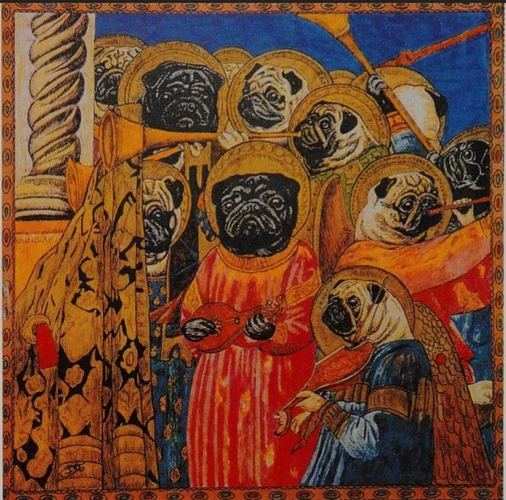
PugJesus
History Major. Cripple. Vaguely Left-Wing. In pain and constantly irritable.
- 97 Posts
- 291 Comments
 0·10 hours ago
0·10 hours ago
 0·10 hours ago
0·10 hours agoWikipedia is a reliable single source in academic circles now?
I spent more time than college professors will on the wikipedia article.
… you do fucking realize that college professors tell you that Wiki is unacceptable as a citation for the same reason that they tell you Britannica is unacceptable as a citation, right? That encyclopedias are not suitable citations for academic papers?
Thanks for admitting both that you don’t understand the actual position of academics on encyclopedias and that you didn’t actually read the quoted excerpt from the article, though, I guess. Especially considering that you yourself cited wiki with regards to the Sullivan Expedition.
As you didn’t read the blog post
I’m sorry that projection is the only tool you have. I hope you get better.
We’re done here.
 0·11 hours ago
0·11 hours agoAs it’s easier to spout off a full paste from an article instead of actually reading - here’s a part I’d like to call your attention to:
Sorry that you didn’t even click the fucking link I provided, otherwise you’d realize it wasn’t even close to ‘the full article’. Sorry that providing the relevant material in a quote was still too much effort for you to read - or beyond your capabilities.
I’m also sorry that you think Ben Franklin saying “The Iriquois formed a union, why can’t we?” is some fundamental form of influence on the structure of the US government.
 0·11 hours ago
0·11 hours agoI didn’t dispute the Sullivan Expedition. Sorry that your reading comprehension is so sub-par.
 0·11 hours ago
0·11 hours agohttps://en.wikipedia.org/wiki/Great_Law_of_Peace#Influence_on_the_United_States_Constitution
John Rutledge of South Carolina, delegate to the Constitutional Convention, read excerpts of various Iroquois Treaties to the drafting committee, however an English translation of the Great Law of Peace was not created until the 19th century.[37][38]
The influence of Six Nations law on the U.S. Constitution is disputed by scholars.[39] Haudenosaunee historian Elisabeth J. Tooker has pointed to several differences between the two forms of government, notably that all decisions were made by a consensus of male chiefs who gained their position through a combination of blood descent and selection by female relatives, that representation was on the basis of the number of clans in the group rather than the size or population of the clans, and that the topics discussed were decided by a single tribe. Tooker concluded there is little resemblance between the two documents or reason to believe the Six Nations had a meaningful influence on the American Constitution and that it is unclear how much impact Canassatego’s statement at Lancaster actually had on the representatives of the colonies.[40] Stanford University historian Jack N. Rakove argued against any Six Nations influence, pointing to lack of evidence in U.S. constitutional debate records and examples of European antecedents for democratic institutions.[41]
Journalist Charles C. Mann has noted other differences between The Great Law of Peace and the original U.S. Constitution, including the original Constitution’s allowing denial of suffrage to women and majority rule rather than consensus. Mann argues that the early colonists’ interaction with Native Americans and their understanding of Iroquois government did influence the development of colonial society and culture and the Suffragette movement but stated that “the Constitution as originally enacted was not at all like the Great Law.”[41][42]
Other critics of the Iroquois-influence theory include Samuel Payne, who considered the Iroquois division of powers as seen by Adams as being unlike those in the U.S. Constitution;[43] William Starna and George Hamell, who described errors in Grinde’s and Johansen’s scholarship, particularly on Canassatego and the Lancaster Treaty;[44] and Philip Levy, who also wrote that Grinde and Johansen had misused Adams’s material, stating that he was not describing the Iroquois Confederacy government separation of powers and model of government but that he was instead describing England’s structure.[45]
Nice citation of Britannica that says absolutely nothing about your claim, by the way.

 5·15 hours ago
5·15 hours agoWhy does the tech industry affect people in such a bizarre way?
 0·16 hours ago
0·16 hours agoSeems you’re skipping forward to the current founding of the united states, which was ~1776.
… considering that there was no ‘United States’ prior to 1776, this seems a pretty natural position to take.
The us constitution was modeled after the local Haudenosaunee Confederacy population’s government.
This is a pop history myth.
 0·16 hours ago
0·16 hours agono. use of appropriate violence lead to the slaves being free
… by a massive state apparatus that was elected by people who believed in abolition.
Jesus Christ. Dogmatic thinking that would make a religious fanatic blush.
 0·16 hours ago
0·16 hours agoSays the person pretending Donald Trump was an equal opportunist who never wrote “C” in tenant applications in a land that has been gentrificated again and again.
… what weird shit are you making up about me in your head?
 0·17 hours ago
0·17 hours agoWhat utterly bizarre, delusional, and ahistorical interpretations.

 16·16 hours ago
16·16 hours agoDon’t worry, like so many other totally-genuine-posters on here, he’s never seen a tankie on Lemmy in his life, it’s all a shitlib delusion. And Russia isn’t that bad! Whatabout the West???
Just like Ensign_Crab, who came here to downvote this to show solidarity with a fellow bootlicker. :)
 0·17 hours ago
0·17 hours agoWas also crucified by merchants in the Church.
Fucking what.
Is this what libertarians propagandize now, that Abraham Lincoln freed his slaves because he utterly believed his slaves had rights?
…
 0·17 hours ago
0·17 hours ago… not really? Most countries were created in modernity or early modernity, and almost all of them have deep ethnic and linguistic roots.
The USA was founded on a few idealistic scraps of paper.
We can argue whether that helps or hurts, but it is unusual in world history.
 0·17 hours ago
0·17 hours agoJesus fucking Christ.
Defending one’s community against imperialism and/or fascism is no crime.
 0·2 days ago
0·2 days ago[screaming in educated American]
… absolutely by the common people.
Capital man needs more boxes
I don’t know where you’re taking this. Can you just say what you want said instead of asking questions?
[Food being produced for personal gain and letting the ‘unworthy’ starve] was true before capitalism, though.
To take more than you give. To make something not for the good of all, but for the good of you.
… and you think people making things for their own good rather than the collective is an invention of capitalism?
Because we are making food to be sold first, then eaten, rather than be eaten without first being sold.
What do you think trading is if not selling and buying?






